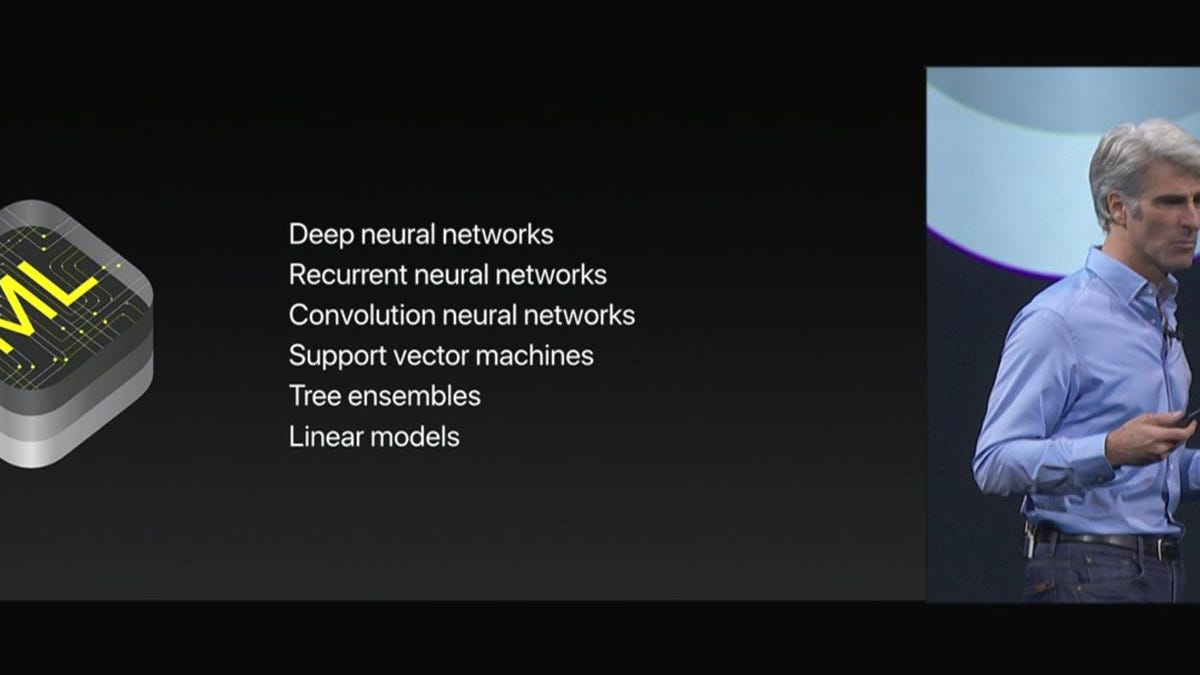Macs, iPhones, Siri getting new AI brain power
With machine learning, Siri won't sound robotic and advertisers will have a harder time tracking what you're doing on the web, Apple says at WWDC.

Apple's Craig Federighi touts new machine learning and AI features coming to iPhones at WWDC.
Your Apple hardware is about to get a notch smarter as the company builds new artificial intelligence abilities into Macs and iPhones -- and lets other programmers tap into that power.
AI technology will mean Siri better understands what you want and speaks with a computer voice that Apple says sounds natural. Craig Federighi, senior vice president in charge of Mac and iPhone software, announced the AI technology Monday at the company's annual WWDC event for developers in San Jose, California. On Macs, it'll monitor your web browsing behavior to block advertising companies from tracking some of what you do online.
And that's not all. A new interface will let third-party programmers tap into Apple AI abilities, including speech recognition and image processing. The iPhone will better accommodate AI technology prepared ahead of time on massive data centers before being brought to phones and PCs.
"We want to make powerful machine learning easy to use in your apps," Federighi said. He shied away from the term "AI," though, preferring instead the more specific terms "machine learning" and "deep learning."
AI is making computing devices dramatically more useful by, for example, recognizing your friends' faces in photos or letting you dictate text messages. AI powerhouses like Google and Facebook use massive data centers to teach AI systems what to do, but the resulting AI smarts then can be squeezed into phones.
AI has an important role to play at Apple, a company whose core mission has been to make technology more accessible to everybody. AI can make computers understand what humans want and then package the results in a way we can use.
"We're moving from an era where you need to be technology-literate, where people need to understand the computers, to an AI era where technology understands the people," said Gartner analyst Tuong Nguyen. "That's what sets Apple apart from everybody else, and it's why they've been doing so well."
AI is a hype-heavy term these days, but there's real technology behind the buzzword. Traditional programming is very rigid; under this circumstance, do that. The machine learning behind AI, though, is trained by feeding raw data into a massive "neural network" and letting the computer when it gets the right answer. You don't have to worry about encoding all the details about what exactly a kitten looks like, you just have to have a lot of photos of kittens to train the system.
Apple already uses machine learning for a number of tasks, including rejection of stray palm swipes, grouping photos into events called memories, and extending phone battery life by better understanding what you're doing.
Apple has used a human to record Siri's voice, but AI is bringing a new sound with a computer-generated male or female voice. Federighi demonstrated how the voice used different inflections when repeating the word "sunny" three times in a row in a weather report. A male Siri voice offered a little pun: "I want machine learning, especially since I'm a machine, learning."
First published June5, 11:50 a.m. PT.
Update, 12:55 p.m.: Adds comment from Gartner analyst.

